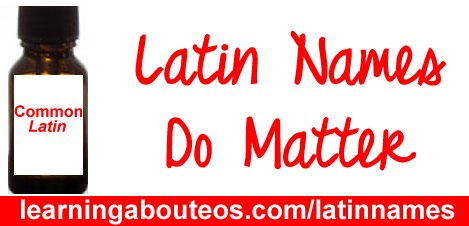
Latin Names Do Matter
Knowing the Latin (botanical) name of the essential oil you have can help you distinguish between different species of the same genus. There are certain species of essential oils that require more caution when using, and knowing this information can also help you make better therapeutic choices.
Eucalyptus, for example, has at least four different species: Eucalyptus radiata, Eucalyptus globulus, Eucalyptus citriodora, and Eucalyptus dives. The first three of these are safe for pregnant women to use, but Eucalyptus dives is not due to high ketone content.
Lavender is another example of an essential oil with different species. If you’re looking to relieve a headache, Lavandula latifolia (Spike Lavender) is the one you want, where Lavandula angustifolia (Lavender) is best used for its antispasmodic effects. If you have epilepsy, you’ll want to avoid Lavandula latifolia, where Lavandula angustifolia is a safe choice.
Some companies do not have these Latin names clearly labeled on the bottle. If you order online, make sure you read the description on the website so you are clear on what you are getting. Some companies may be unclear by the common name they choose to use. All species of Rosemary, for example, are sold under the name “Rosemary.”
Not all essential oils have multiple species, however. And some species will have their own unique common name.
For example Melaleuca alternifolia is always referred to as Tea Tree essential oil. Another species of the same genus, Melaleuca quinquinervia, is referred to as Niaouli. This provides distinction between the two species, which have different therapeutic properties, and prevents any confusion that may be caused by calling them both Melaleuca.
Reputable companies will have the Latin (botanical) name clearly marked on the front of the bottle, usually right under the common name.
Excerpt taken from the e-report, Using Essential Oils Safely. FREE when you sign up for our newsletter here.
| Lea Harris is a Certified Aromatherapist with Advanced Graduate training from Aromahead Institute in July 2013, but she is not a doctor. Please consult a trained aromatherapist or your doctor before using any of the suggestions on this website, as the user's age and health conditions must be taken into account before using. The information contained in this website is for informational purposes only, and should not be used as a substitute for professional medical advice. |


Comments
Powered by Facebook Comments